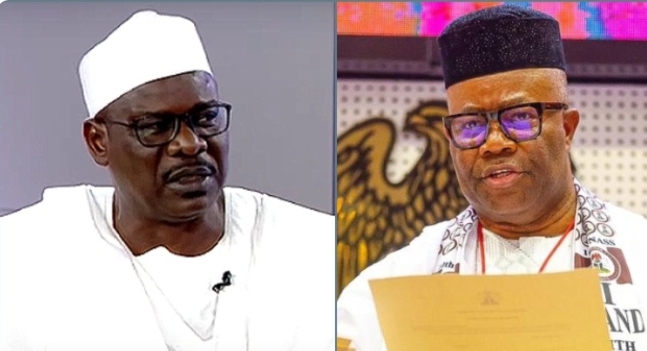The dramatic Senate session where Chief Whip Ndume confronted President Akpabio, leading to an emergency closed-door meeting.
The Senate President, Godswill Akpabio, found himself calling for an emergency closed session on Tuesday, October 17, during a routine plenary session.
The trigger for this unexpected development was Senator Mohammed Ali Ndume, the Chief Whip of the Senate, who chose to walk out of the Senate chambers after an intense exchange with Akpabio.
Ndume had invoked order 54 of the Senate Standing Orders, raising a point of order and expressing concerns about the way Senate affairs were being conducted.
He pointed out that certain actions within the chamber were not aligning with the established rules.
In his words, “Mr. President, there are some things we do in this chamber that are against the rules. Sir, nobody is too big to learn….”
At this juncture, Akpabio swiftly interjected, demanding a copy of the Standing Orders.
He proceeded to read order 54, asserting that it did not substantiate the point Ndume was making, and subsequently ruled him out of order.
Unhappy with this ruling, Ndume, visibly angered, gathered his files and papers, making a swift exit from the chamber. He headed directly to his office.
The Chief Whip had hardly settled into his office when he received a call from a fellow colleague, urging him to return to the chamber for an executive session.
At the time of reporting, the executive session was still in progress.
It’s important to note that Ali Ndume had previously criticized Akpabio’s approval of the passage of certain executive bills without seeking input from other Senate members.
A video that surfaced from an earlier session captured Ndume’s vocal disapproval of the Senate President for passing specific bills without formal readings and contributions from members.
Senator Ogoshi Onawo, representing Nasarawa State under the Peoples Democratic Party, also voiced concerns about Akpabio’s haste in pushing through legislation.
He emphasized the need for senators to be well-informed, conduct research, and make valuable contributions.
Rushing bills, even money-related ones, within a two-hour window, he argued, wasn’t in the best interest of the country.
In response to Onawo’s criticism, Akpabio chose not to offer a defense but merely stated, “If the bills we pass are good for the country, history will judge me right.
I don’t think we would come here to pass a bill that’s not good for the interest of Nigerians. So, your point of order is noted.”
This incident sheds light on the political tensions and controversies within the Nigerian Senate, showcasing the clash between members seeking adherence to rules and those advocating for a more thorough legislative process.
The executive session following Ndume’s walkout remains shrouded in mystery, and its outcome will likely have significant implications for Nigeria’s legislative landscape.











